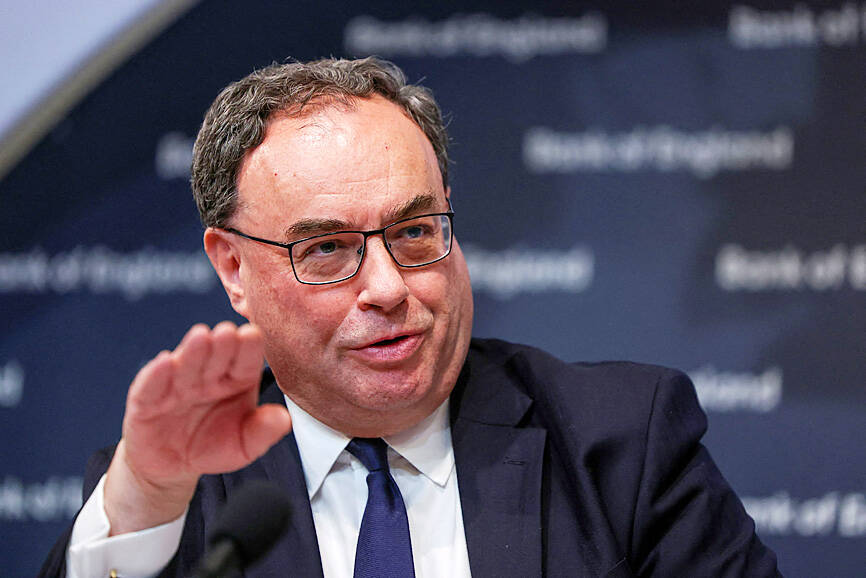Bank of England (BOE) Governor Andrew Bailey rejected the need for an inflation target higher than 2 percent, warning that changing the goal would “unpick expectations.”
He told a conference in Aix-en-Provence in France that the BOE has flexibility built into its remit that can give the central bank longer to bring price growth down, but that it was “critical that flexibility isn’t confused with not pursuing 2 percent.”
The BOE is grappling with inflation at 8.7 percent, over four times its remit. It raised rates by a surprise half point to 5 percent last month. Markets now expect it to increase them to 6.5 percent to prevent a wage-price spiral.

Photo: Reuters
Some economists have suggested raising the inflation target to 3 percent to take immediate pressure off central banks and avert a rate-induced slump. If the BOE lifts its benchmark to 6.5 percent, most economists believe a recession will be inevitable.
Bailey conceded that the problems were “more severe in the UK” than in Europe, but insisted: “We will bring inflation back to target,” and that “we do have some flexibility about how quickly we bring it back to target.”
Meanwhile, the European Central Bank (ECB) is nearly finished raising interest rates, but will then keep them at a “high plateau” to ensure they fully impact the economy, Governing Council member Francois Villeroy de Galhau said.
“In the euro area, I believe we will soon reach the high point of interest rates,” Villeroy said at the annual Aix-en-Provence conference. “But when I say high point this isn’t a peak, rather it will be a high plateau, on which we will have to remain for a sufficiently long time to fully transmit all the effects of monetary policy.”

The New Taiwan dollar is on the verge of overtaking the yuan as Asia’s best carry-trade target given its lower risk of interest-rate and currency volatility. A strategy of borrowing the New Taiwan dollar to invest in higher-yielding alternatives has generated the second-highest return over the past month among Asian currencies behind the yuan, based on the Sharpe ratio that measures risk-adjusted relative returns. The New Taiwan dollar may soon replace its Chinese peer as the region’s favored carry trade tool, analysts say, citing Beijing’s efforts to support the yuan that can create wild swings in borrowing costs. In contrast,

Nvidia Corp’s demand for advanced packaging from Taiwan Semiconductor Manufacturing Co (TSMC, 台積電) remains strong though the kind of technology it needs is changing, Nvidia CEO Jensen Huang (黃仁勳) said yesterday, after he was asked whether the company was cutting orders. Nvidia’s most advanced artificial intelligence (AI) chip, Blackwell, consists of multiple chips glued together using a complex chip-on-wafer-on-substrate (CoWoS) advanced packaging technology offered by TSMC, Nvidia’s main contract chipmaker. “As we move into Blackwell, we will use largely CoWoS-L. Of course, we’re still manufacturing Hopper, and Hopper will use CowoS-S. We will also transition the CoWoS-S capacity to CoWos-L,” Huang said

Nvidia Corp CEO Jensen Huang (黃仁勳) is expected to miss the inauguration of US president-elect Donald Trump on Monday, bucking a trend among high-profile US technology leaders. Huang is visiting East Asia this week, as he typically does around the time of the Lunar New Year, a person familiar with the situation said. He has never previously attended a US presidential inauguration, said the person, who asked not to be identified, because the plans have not been announced. That makes Nvidia an exception among the most valuable technology companies, most of which are sending cofounders or CEOs to the event. That includes

INDUSTRY LEADER: TSMC aims to continue outperforming the industry’s growth and makes 2025 another strong growth year, chairman and CEO C.C. Wei says Taiwan Semiconductor Manufacturing Co (TSMC, 台積電), a major chip supplier to Nvidia Corp and Apple Inc, yesterday said it aims to grow revenue by about 25 percent this year, driven by robust demand for artificial intelligence (AI) chips. That means TSMC would continue to outpace the foundry industry’s 10 percent annual growth this year based on the chipmaker’s estimate. The chipmaker expects revenue from AI-related chips to double this year, extending a three-fold increase last year. The growth would quicken over the next five years at a compound annual growth rate of 45 percent, fueled by strong demand for the high-performance computing